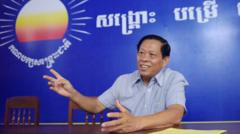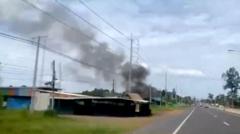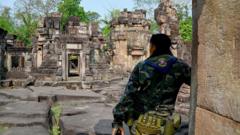The tragic shooting of Lim Kimya, a prominent Cambodian opposition politician, in Bangkok appears to be a calculated political killing. As investigations unfold, implications regarding regional repression and complicity among neighboring countries intensify.
High-Profile Assassination in Bangkok Raises Questions of International Repression

High-Profile Assassination in Bangkok Raises Questions of International Repression
The assassination of Cambodian opposition figure Lim Kimya in Bangkok has sparked concerns about cross-border political repression in Southeast Asia.
In a shocking turn of events, Lim Kimya, a 73-year-old former parliamentarian from Cambodia's banned opposition party, was fatally shot in Bangkok, leading to speculations about international political motives behind the act. The assassination unfolded in the royal quarter of Bangkok, where surveillance footage captures a man parking his motorcycle, removing his helmet for visibility, and calmly walking across the road before gunfire erupted shortly after.
Lim Kimya, who held dual Cambodian and French nationality, had reportedly just arrived in Thailand with his wife from Cambodia. Despite attempts at resuscitation, he was pronounced dead at the scene after being struck by two bullets in the chest. His daughter, Monovithya Kem, expressed her belief that only the Cambodian state would have a vested interest in his death, marking this incident as more than a random act of violence.
This chilling event recalls the assassination of other political critics in Cambodia, such as the 2016 murder of activist Kem Ley. The Thai police have identified the shooter as a former navy officer, now working as a motorbike taxi driver, suggesting that tracking him down may not be overly complicated. However, the critical matter remains whether rigorous investigations will take place.
The implications of Lim Kimya's assassination extend beyond the act itself, pointing to a troubling pattern of regional repression where governments in Cambodia, Vietnam, Laos, and Thailand collaborate to target dissidents. Human rights organizations have noted instances where fleeing activists have been forcibly returned to their home countries, facing imprisonment or worse. Thailand's practice of returning Cambodians has raised serious concerns, especially after sending back refugees recognized by the UN.
As Cambodia transitions to the leadership of Hun Manet, son of former Prime Minister Hun Sen, scrutiny over human rights conditions and treatment of political dissenters persists. Despite speculation about more lenient governance, opposition voices continue facing harsh repressive measures.
The assassination is a pressing challenge for Thailand, especially as it seeks to demonstrate a commitment to human rights within the international arena, especially following its recent election to the UN Human Rights Council. Calls for accountability regarding this brazen act in the heart of Bangkok grow louder, emphasizing the urgent need to combat this wave of political violence and transnational repression in the Mekong region.


















